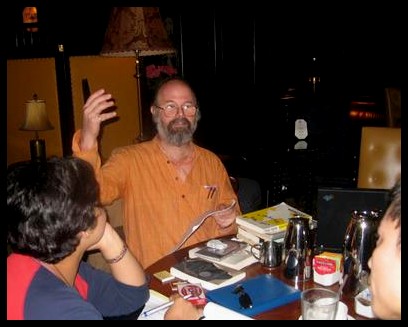[subtitle]:
A Playful Look at Attempts to Solve the Problems of Paradox and Self-Reference
Thank you, Douglas Hofstadter.
Following some relevant epigraphs, the first paragraph reads:
This essay is full of mistakes. Idea after idea and sentence after sentence is simply wrong. This sentence, for example, is false. Worse yet, this not even complete sentence! A long time ago (so the legend goes) a Cretan prophet by the name of Epimenides declared that "All Cretans are liars." This paradoxical statement has come to be known as the Epimenides paradox or the Liar paradox This Adam (or atom) of paradoxes has been reformulated into countless variants, yielding such gems as "I am lying," and "this sentence is false." It has been split, ("The following sentence is true. The preceding sentence is false.") boxed, translated and quoted in the Bible. In short, one would assume that the Liar Paradox had been beaten to death. In 1931, a German mathematician named Kurt Gödel breathed new life into the Liar paradox in a paper poetically entitled "On Formally Undecidable Propositions in Principia Mathematica and Related Systems I": Gödel's work demonstrated that paradox forms an implicit part of every axiomatic system of logical reasoning. In this essay, I will be examining the problems which self reference and paradox pose to systems of reasoning especially formalized mathematical and logical reasoning. These two areas, in their quest for objective truth become very interesting in the light of Gödel's revelations. In the end, it may turn out that their quests for a formalized objective truth may have been in vain. In addition, I will sometimes be referring to myself (with good reason).
For the whole thing, click on the title of this blog post.
===================
[An email]:
Hey Vasudev,
some time ago, you asked me if I was interested in mathematics. I replied "not particularly" or words to that effect.
However, at the moment I'm reading an essay which does interest me. It's related to mathematics rather abstractly. Evidently it's a well-known late 20th century essay (among philosophers etc.), first appearing in some journal, then in a book, Metamagical Themas: Questing for the Essence of Mind and Pattern (1985). The essay also exists online. I've linked to it on my blog here:
This is not the title of this essay
-- but at the moment I'm only some ways into reading it.
The author is a certain Douglas Hofstadter, otherwise best known for his book Godel, Escher, Bach (1979) -- one of those quite well-esteemed works (among some creative intellectuals) that I've not yet read. Logic is, at least, a sort of passing interest -- especially when it's colorfully explored, as here. I suppose one reason the essay's topic is interesting, is that it directly relates to some basic facets of language: specifically, self-reference in a statement, and how paradox is possible in such uses of language. As such, it recollects, for example, Rene Magritte's painting "This is not a cigar". Perhaps I'll try to track down the latter and (if finding it) add it to the blog item.
cheers,
d.i.
===================
Googling for the Magritte painting, instead I find another essay, in the form of a PDF document, here:
SOVEREIGN STAIN: ON RENÉ MAGRITTE'S HEGEL'S HOLIDAYI had never heard of Magritte's painting called
Hegal's Holiday, but it is an intriguing title by an interesting painter. It's 5:30 a.m., perhaps I'll read some ways into the Magritte thing, and locate the cigar painting later.
Meanwhile, vernal birds are already heard outside the window -- though it's basically dark yet.
===================
Well it's an interesting essay about Magritte's work (largely). Unfortunately the author is not noted (one should wish to give a proper attribution). All I know is that the essay (or paper) is found in an archive from the University of Queensland. It quotes somewhat extensively from Suzi Gablik's well-known book about Magritte -- another of the books I respect but have not yet read.
I once had a phone conversation with Suzi Gablik though. I was (briefly) an editor of a thing called SOMA Magazine, in San Francisco. I guess this was in 1988. I think I had read an article Suzi had written in some art magazine -- perhaps The New Art Examiner. I phoned her to discuss it. This also reminds that in 1988, I visited the editors of The New Art Examiner, in Washington, DC. But later the publication moved -- I guess back to Chicago(?).
When I met with Peter Wollen (the filmmaker/professor) in LA, around the same time, I mentioned something about The New Art Examiner to him. He sort of laughed and remarked that so-and-so (the publisher of that magazine) used to be the guy who would crash in his living room. Now he was, it seemed, at least an established publisher. Both Peter and this publisher (I don't recall the chap's name) are British expats in America. I wrote a couple of short items for The New Art Examiner, but didn't keep in touch. Perhaps it still exists.
===================
Quite silly of me. Of course the sentence in Magritte's painting is "This is not a pipe." Cigars don't come into the picture.

René Magritte - The Treason of Images (aka This Is Not A Pipe)





